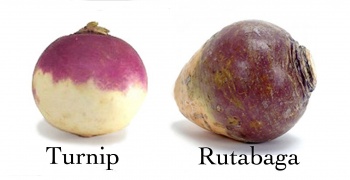Turnip
From Wikiwel
Other Names : White turnip (Brassica rapa subsp. rapa)
Turnips, members of the cruciferous family of vegetables, along with broccoli, collards, kale and Brussels sprouts, grow in temperate climates throughout the world. Most commonly grown for their white bulbous roots, turnip leaves and sprouts are also edible and highly nutritious.
See also :
Special Precautions of Turnip
Don't confuse with Rutabaga.
Benefits and uses of Turnip are
- Cancer Prevention : Turnips are cruciferous vegetables. They contain high levels of antioxidants and phytonutrients associated with reduced risk of cancer. The glucosinolate levels in turnip greens are excellent. Research shows that plant compounds like glucosinolates help the liver process toxins, fight the effects of carcinogens and may even inhibit the growth of tumors.
- Heart Health : Turnips have great anti-inflammatory properties, which are considered key in preventing heart attacks and heart disease. They may also help the body lower cholesterol and contain excellent amounts of folate, a B-vitamin that is critical to cardiovascular health.
- High In Antioxidants : Turnips offer a wide array of antioxidant support, including vitamin C, vitamin A, vitamin E, manganese and beta-carotene. While the roots are a great source of vitamin C, the leaf greens are chalk full of all of these antioxidants. They also offer complex phytonutrient support, which helps stimulate antioxidant activity and increases the positive results of combatting free radical activity and preventing DNA damage to cells.
- Anti-Inflammatory : Turnip greens are great sources of two excellent anti-inflammatory agents: vitamin K and omega-3 fatty acids. Vitamin K is a potent regulator of the body's inflammatory response system. Research shows omega-3 fatty acids are essential building blocks of the body's inflammation system and help reduce the risk of heart disease, arthritis and other disease that may be the result of chronic inflammation.
- Digestive Health : Turnip greens are high in fiber which helps support the body's digestive system. Some research suggests that glucosinolates may also help the stomach process bacteria like Helicobacter pylori.
- Bone Health : Turnips are a great source of calcium and potassium, essential minerals for healthy bone growth and helping to prevent bone diseases such as osteoporosis.
- High In Fiber : Fiber helps regulate the metabolism, controls body weight and supports a healthy, active colon. Turnip greens offer about 20% the DV of fiber.
- Weight Loss : Any low calorie, nutrient rich foods like turnips can be a great addition to an effective weight loss program. The high fiber content of turnips should promote an active, healthy metabolism as well.
